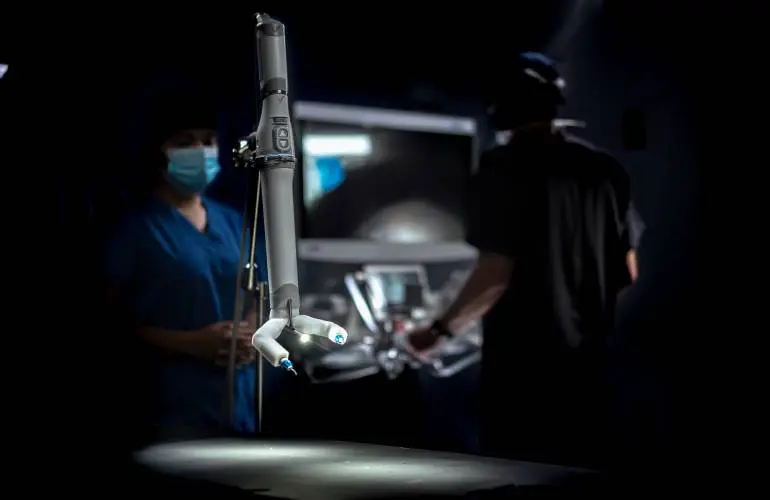 Laura Classen, executive director of the Nebraska Angels, put on a clinic Thursday, telling about 30 entrepreneurs and other attendees how the Angels and angel investment works.
Laura Classen, executive director of the Nebraska Angels, put on a clinic Thursday, telling about 30 entrepreneurs and other attendees how the Angels and angel investment works.
The talk was a part of the Spark Series, a set of entrepreneurial talks at Union Bank and Trust’s Catalyst space in Lincoln.
Classen talked “Angel Investing 101,” discussing how startups go about raising angel funds, the life cycle of startup capital needs and when to reach out for investment.
The Nebraska Angels group was founded in 2006 at the forefront of the angel movement. Classen is in charge of sourcing deals to see if they’re a good fit for the group.
There are 55 local, active investors who work together to find new deals and negotiate terms. Over the past two years, the Angels have deployed $4 million in capital, investing in early-stage, high-growth opportunities.
On average, the Angels do about eight deals a year in new and follow-on funding for mostly local startups. Members decide individually whether or not to invest in an opportunity.
But just like startups, the failure rate for angel investors isn’t good either. Nearly 80 percent of deals are money losers.
But Classen said angels are usually people who have reasons more than trying to make a buck.
“They are high-risk, high-reward, long-term investments,” Classen said. “But usually they like to give back and like the opportunity to work with entrepreneurs because many angels once were entrepreneurs themselves.”
Angels have to be accredited to be in the Nebraska Angels, meaning they have to meet a certain wealth threshold or make more than $200,000 in income per year.
Usually the angels invest in early seed rounds for scalable, high-growth companies. Investments usually range from $250,000 to $3 million and come with the benefit of the angels’ network, connections and expertise.
“We often call it the friends, families and fools round,” Classen said.
The investment process
Companies apply to the angels and Classen vets and meets with the startups for about two hours before they attend small meetings with a handful of investors. Then, if they are interested, they move on to a larger meeting with the entire group at Quarry Oaks in Ashland. Investors see about four pitches at those larger meetings and then individual investors rate opportunities and their interest in each company.
She said timing is important for when a startup approaches the angels.
“It’s like a first date—you want it to go well and have a good first impression,” she said. “If you don’t and it’s not the right timing or you bomb the pitch, the second time you come back is harder.”
But for the startups, it’s ideal to wait as long as possible before they seek angel investment.
More than 300 companies apply to the Angels every year, but only about 150 meet their criteria. The process can take anywhere from a month to three months to complete.
Most angel investors invest during a startup’s “Valley of Death,” the time after a product launch but before it makes money. Usually, most startups find grants like the Small Business Innovation Research grants to get a concept going.
But there’s three things the Angels need to see before putting in money: a customer, a CTO in a tech startup and a solid team.
The best applicants
- They know their industry and are experts in their space.
- The problem they’re solving is real and their solution is a good one.
- It’s more about the team than the company or idea.
- One of the Angels’ best investments have been EyeVerify, a KC biometric security startup, that also recently got investment from Sprint, Samsung and more. Their pre-money valuation was $40 million.
- They haven’t had any cash exits, but Classen says there’s hope in growing companies, like EyeVerify.
- Other consumer products haven’t fared so well and crashed before becoming profitable, Classen says.
Audience Q&A
- On partnerships: The angels also are connected with groups in Alabama, Iowa and Texas and occasionally come together to do group deals.
- On gauging success: They do track company goals, but sometimes it is hard to figure out what metrics to track for each company. Success looks different to different companies.
- On finding more members: The angels usually find new members through referrals.
- On angel vs. VC process: It’s a similar level of scrutiny. But angel investment feels less like 1-on-1 dating because you don’t work with the same investor every time. It’s also more structured since the Angels meet on set dates.
- On the next five years: She hopes they’ll be going strong and hope to engage more people outside of Omaha and Lincoln.
Next Spark Series is Sept. 17
The next Spark Series speaker is David Weisser of Quantum Workplace, the company that measures and celebrates America’s Best Places to Work, who will talk about how to maintain culture as you grow. Register here.





2 responses to “Nebraska Angels director spells out what brings investment”
Great insight, Laura! Thanks for sharing…
[…] Original article published by Silicon Prairie News https://spnewsnjt.wpengine.com/2014/08/nebraska-angels-director-spells-out-what-brings-investment/ […]